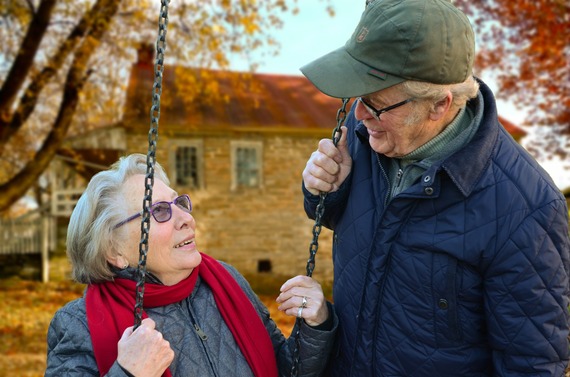More and more Americans are living to 100. Over the 30 year period from 1980 to 2010, the centenarian population had a larger percentage increase than the population as a whole. At the time of the 2010 census, there were 53,364 Americans who needed a lot more candles on their birthday cake than the average cake could hold.
"Live long and prosper," as Mr. Spock says on Star Trek. Thanks to a combination of better diet, awareness of the benefits of exercise, the hazards of smoking, and greatly improved health care, more and more of us are doing just that- living longer and prospering.
Curiously, though, our life expectancy isn't any greater than that of our ancestors.
There's a mistaken notion that human life expectancy has increased over the millennia. The truth is, if our cave-dwelling ancestors were lucky enough in their lifetimes to survive the pitfalls of childhood, escape the unsavory intentions of saber tooth tigers and their colleagues, and be nimble enough to both outrun their enemies and avoid falling off rock ledges, they could be expected to live as long as us. "Life expectancy" is a statistical average. It factors in infant deaths, which were much greater early on. So while the "life expectancy" at birth of hunter-gatherers might have been 26 years, those who survived into adulthood had the potential to live some three times as long.
It's highly doubtful, though, that a foraging lifestyle could have produced a centenarian back then. We may not have a greater biological propensity for longevity than our forebears, but there's a greater chance that we'll hit the big 100 thanks to a less hazardous and healthier lifestyle and to the support of modern medicine.
Another reason there are more centenarians today is simply that our overall population is greater, which gives us a better statistical shot at it.
At the same time, attitudes about old age are also changing. Retirement at 65 is an antiquated concept. Baby Boomers are just getting warmed up by then. Based on the old retirement model, Warren Buffet should have been put out to pasture 20 years ago. Fortunately for his investors at Berkshire Hathaway he's still at the helm at age 85 (his co-chairman, Charlie Munger, is 92).
Grandma Moses first started painting at age 78 (she lived to 101).
And this primary election season has given us a glimpse of the amazing energy and drive of the remaining three candidates for president, all of whom are older than the old mandatory retirement age (they're all over 68).
In terms of longevity potential, the oldest living human was Jeanne Calment, a French woman who lived to 122 years. At 85 she took up fencing. She rode her bicycle until she was 100. She lived on her own until 110. At age 90 she sold her apartment with the proviso that the purchaser pay her a monthly sum of 2,500 francs (around $400) until she died. The purchaser probably thought he was getting a good deal, but he wound up paying twice the apartment's value, and when he died, his widow continued the payments.
With the growing number of centenarians today, and their likelihood of being in better health than ever before, 100 could well be the new 90. Sure, genes and family history have a lot to do with it, but so do factors such as exercise, smoking, drinking, drug use, environment, sleep and health care, to name a few. Absolute numbers can be misleading. In terms of ability to function and quality of life, one person's 100 can be another person's 90. It turns out the old saying, "you're as young as you feel," was right on the money after all.
Follow Eric J. Hall on Facebook!
